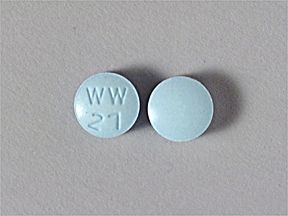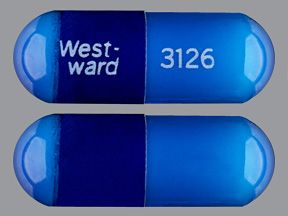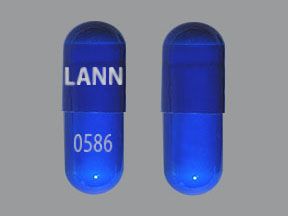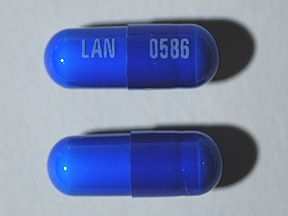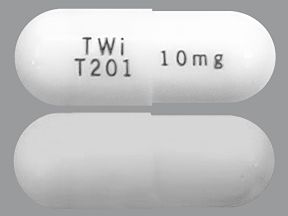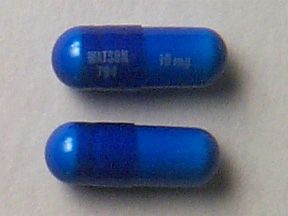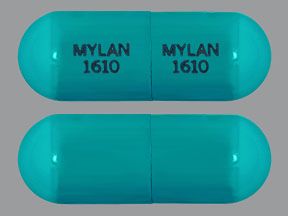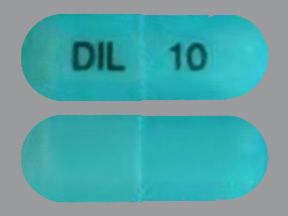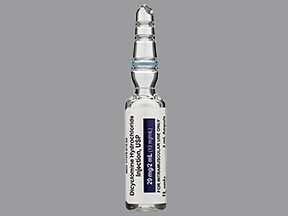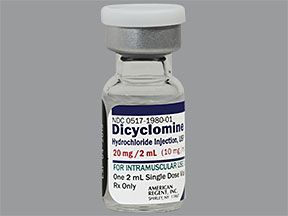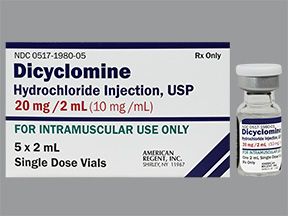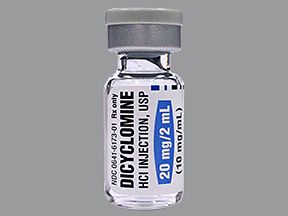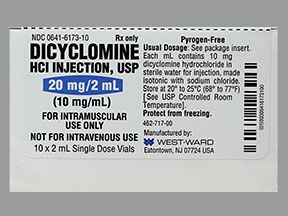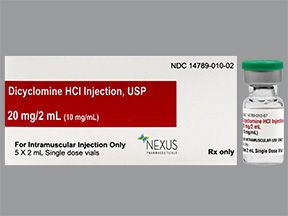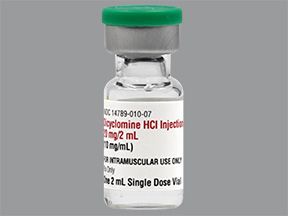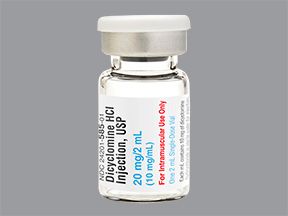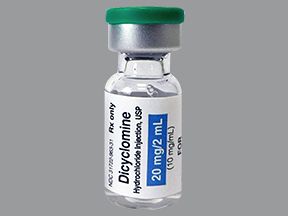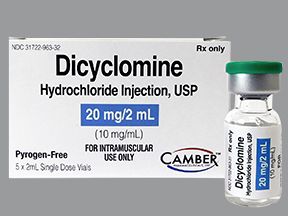Highlights for dicyclomine
- Dicyclomine oral tablet is only available as a generic drug.
- Dicyclomine comes in three forms: an oral tablet, an oral capsule, and an injection that’s given by a healthcare professional in a clinic.
- Dicyclomine oral tablet is used to treat spasms in your stomach caused by bowel disorders such as irritable bowel syndrome.
- Central nervous system warning: This drug may affect your brain and may cause you to become confused or disoriented. It may also cause short-term memory loss, hallucinations, weakness, trouble falling asleep, anxiousness, euphoria (a sense of feeling extremely happy), stammering or stuttering when speaking, or loss of muscle control in your arms or legs.
- Intestinal obstruction warning: This drug may make any blockage in your intestines worse. This is especially true for people who have had part of their digestive tract removed. Diarrhea is an early symptom of intestinal blockage.
- Heat stroke warning: This drug causes you to sweat less. If it’s very hot and you’re not sweating, your body can overheat (heat stroke). Symptoms of this include fever, tiredness, dizziness, muscle cramps, and a fast heart rate. If you think you have heat stroke, move to a cooler place, drink cool water, and call your doctor.
Dicyclomine oral tablet is a prescription drug. It’s available as a generic drug in this form. Generic drugs usually cost less. In some cases, they may not be available in every strength or form as the brand-name version.
Dicyclomine also comes as capsule or solution that you take by mouth, and an injection. The injection is only given by a healthcare professional in a clinic.
Why it’s used
Dicyclomine is used for treatment of symptoms such as spasms in your stomach caused by bowel disorders, including irritable bowel syndrome. It can be used as part of a combination therapy. This means you may need to take it with other medications.
How it works
Dicyclomine belongs to a class of drugs called anticholinergics. A class of drugs is a group of medications that work in a similar way. These drugs are often used to treat similar conditions.
This drug affects specific muscles in your stomach and intestines called the smooth muscles. It helps to relax these muscles to relieve the spasms that functional bowel disorders cause in this part of your digestive system.
Dicyclomine oral tablet may cause drowsiness. You shouldn’t do anything that requires you to be mentally alert, such as driving or operating machinery, until you know how this drug affects you. This drug may also cause other side effects.
More common side effects
The more common side effects of dicyclomine can include:
- dry mouth
- dizziness
- blurry vision
- nausea
- sleepiness
- weakness
- nervousness
If these effects are mild, they may go away within a few days or a couple of weeks. If they’re more severe or don’t go away, talk to your doctor or pharmacist.
Serious side effects
Call your doctor right away if you have serious side effects. Call 911 if your symptoms feel life-threatening or if you think you’re having a medical emergency. Serious side effects and their symptoms can include the following:
- Abnormal or rapid heart rate
- Eye problems. Symptoms can include:
- blurry vision
- difficulty moving your eyes
- sensitivity to light
- Allergic reactions. Symptoms can include:
- swelling of your face, tongue, throat, arms, and legs
- trouble breathing or swallowing
- skin rash, welts, or hives
- Temporary episodes of memory loss
- Irritation
- Confusion
- Delusions
- Disorientation
- Hallucinations
- Sudden and unusual mood or behavior changes
- Decreased breast milk production in people who are breastfeeding
- Skin problems. Symptoms can include:
- redness
- rash
- inflammation of your skin
Disclaimer: Our goal is to provide you with the most relevant and current information. However, because drugs affect each person differently, we cannot guarantee that this information includes all possible side effects. This information is not a substitute for medical advice. Always discuss possible side effects with a healthcare professional who knows your medical history.
Dicyclomine oral tablet can interact with other medications, vitamins, or herbs you may be taking. An interaction is when a substance changes the way a drug works. This can be harmful or prevent the drug from working well.
To help avoid interactions, your doctor should manage all of your medications carefully. Be sure to tell your doctor about all medications, vitamins, or herbs you’re taking. To find out how this drug might interact with something else you’re taking, talk to your doctor or pharmacist.
Drugs that should not be used with dicyclomine
Glaucoma drugs, such as travoprost, latanoprost, acetazolamide, and timolol. Taking dicyclomine with these drugs can reduce or block the effects of these drugs. You shouldn’t take dicyclomine if you take these drugs.
Interactions that can increase the risk of side effects
Taking dicyclomine with certain drugs may raise your risk of side effects such as increased drowsiness, dry mouth, and blurred vision. Examples of these drugs include:
- benzodiazepines (clonazepam, diazepam, and lorazepam)
- amantadine
- quinidine
- antipsychotic agents (chlorpromazine, fluphenazine, perphenazine)
- antidepressants, monoamine oxidase inhibitors (MAOIs) and tricyclic antidepressants such as selegiline, rasagiline, phenelzine, tranylcypromine, amitriptyline, nortriptyline, clomipramine, desipramine, doxepin, imipramine, protriptyline, trimipramine
- Narcotic pain medications such as meperidine
- Nitrates and nitrites
- Antihistamines such as cetirizine, levocetirizine, loratadine, fexofenadine
Taking dicyclomine with digoxin can lead to more side effects from digoxin, including confusion, irregular heartbeat, nausea, vomiting, diarrhea, and blurry or cloudy vision.
Interactions that can make drugs less effective
You should avoid taking over-the-counter antacids together with dicyclomine. Doing so may reduce the amount of dicyclomine that is absorbed by your body. This could make dicyclomine less effective.
Dicyclomine can reduce or even cancel the effects of metoclopramide, which is used to increase or ease the movement of food down the digestive tract (stomach and intestines).
Disclaimer: Our goal is to provide you with the most relevant and current information. However, because drugs interact differently in each person, we cannot guarantee that this information includes all possible interactions. This information is not a substitute for medical advice. Always speak with your healthcare professional about possible interactions with all prescription drugs, vitamins, herbs and supplements, and over-the-counter drugs that you are taking.
Dicyclomine oral tablet comes with several warnings.
Allergy warning
Dicyclomine can cause a severe allergic reaction. Symptoms can include:
- trouble breathing
- swelling of your throat or tongue
If you have an allergic reaction, call your doctor or local poison control center right away. If your symptoms are severe, call 911 or go to the nearest emergency room.
Don’t take this drug again if you’ve ever had an allergic reaction to it. Taking it again could be fatal (cause death).
Alcohol interaction
The use of drinks that contain alcohol can increase your risk of increased drowsiness when taken with dicyclomine. If you drink alcohol, talk to your doctor.
Warnings for people with certain health conditions
For people with heart problems: Dicyclomine may cause a rapid or abnormal heart rate. The risk of this side effect is increased if you already have an abnormal or rapid heart rate, congestive heart failure, or history of heart attack or uncontrolled blood pressure.
For people with myasthenia gravis: Myasthenia gravis is a muscle weakness disease. If you have this disease and take dicyclomine, your disease can get worse. High doses of this drug can even cause paralysis in people with this disease. You shouldn’t use this drug if you have myasthenia gravis.
For people with intestinal obstruction: Dicyclomine can cause or worsen blockage or obstruction of your digestive tract. If you’ve had a portion of your bowel removed (ileostomy or colostomy), you’re at greater risk of this side effect.
For people with ulcerative colitis: Dicyclomine can reduce the movement of your digestive tract. If you have ulcerative colitis and you take this drug, the movement of your digestive tract could be slowed to the point that it can cause a condition called toxic megacolon. Symptoms of toxic megacolon include stomach pain, bloating, a fast heart rate, fever, severe diarrhea, and bloody diarrhea. If you have severe ulcerative colitis, you shouldn’t use this drug.
For men with an enlarged prostate: Use of this drug can cause urinary retention. This can make it difficult for you to urinate. If you have an enlarged prostate, you’re at an increased risk of this side effect if you take this drug.
For people with liver disease: If you have liver disease, your body may not be able to process this drug as well as it should. Taking normal doses of this drug may cause it to build up in your body and increase your risk of side effects. Talk to your doctor before using this drug if you have liver disease.
For people with kidney disease: If you have kidney disease, your body may not be able to get rid of this drug as well as it should. Taking normal doses of this drug may cause it to build up in your body and increase your risk of side effects. Talk to your doctor before using this drug if you have kidney disease.
For people with glaucoma: This drug can increase the pressure in your eyes. If you have glaucoma, this pressure increase could be harmful to your eyes. You shouldn’t use this drug if you have glaucoma or are taking medicines to treat glaucoma.
For people with food poisoning: If you have food poisoning caused by Salmonella bacteria, taking dicyclomine may cause severe damage to the lower part of your digestive tract.
Warnings for other groups
For pregnant women: Dicyclomine is a category B pregnancy drug. That means two things:
- Research in animals hasn’t shown a risk to the fetus when the mother takes the drug.
- There aren’t enough studies done in humans to show if the drug poses a risk to the fetus.
Talk to your doctor if you’re pregnant or planning to become pregnant. Animal studies don’t always predict the way humans would respond. Therefore, this drug should only be used in pregnancy if clearly needed. Call your doctor right away if you become pregnant while taking this drug.
For women who are breastfeeding: Dicyclomine shouldn’t be used in women who are breastfeeding. Dicyclomine may pass into breast milk and may cause side effects in a child who is breastfed. This drug can also lower the amount of breast milk your body makes. Talk to your doctor if you breastfeed your child. You may need to decide whether to stop breastfeeding or stop taking this medication.
For seniors: The kidneys of older adults may not work as well as they used to. This can cause your body to process drugs more slowly. As a result, more of a drug stays in your body for a longer time. This raises your risk of side effects.
For children: This drug hasn’t been studied in children. It shouldn’t be used in people younger than 18 years.
This dosage information is for dicyclomine oral tablet. All possible dosages and drug forms may not be included here. Your dosage, drug form, and how often you take the drug will depend on:
- your age
- the condition being treated
- how severe your condition is
- other medical conditions you have
- how you react to the first dose
Forms and strengths
Generic: Dicyclomine
- Form: Oral tablet
- Strengths: 20 mg
Dosage for functional bowel disorders
Adult dosage (ages 18–64 years)
- The typical starting dose is 20 mg, taken four times per day.
- After 1 week, your doctor may increase your dose to 40 mg, taken four times per day.
- The maximum dose is 40 mg, taken four times per day.
Child dosage (ages 0–17 years)
It hasn’t been confirmed that dicyclomine is safe and effective for use in people younger than 18 years.
Senior dosage (ages 65 years and older)
The kidneys of older adults may not work as well as they used to. This can cause your body to process drugs more slowly. As a result, more of a drug stays in your body for a longer time. This raises your risk of side effects.
Your doctor may start you on a lowered dose or a different dosing schedule. This can help keep levels of this drug from building up too much in your body.
Disclaimer: Our goal is to provide you with the most relevant and current information. However, because drugs affect each person differently, we cannot guarantee that this list includes all possible dosages. This information is not a substitute for medical advice. Always to speak with your doctor or pharmacist about dosages that are right for you.
Dicyclomine oral tablet is used for both short-term and long-term treatment of irritable bowel syndrome. It comes with serious risks if you don’t take it as prescribed.
If you stop taking the drug suddenly or don’t take it at all: The spasms in your intestines may not get better or may get worse.
If you miss doses or don’t take the drug on schedule: Your medication may not work as well or may stop working completely. A certain amount of this medicine needs to be in your body at all times for it to work. You shouldn’t stop the medicine without talking to your doctor first.
If you take too much: You could have dangerous levels of the drug in your body and experience more severe side effects. Signs and symptoms of overdose include:
- headache
- nausea
- vomiting
- blurred vision
- dilated pupils
- hot, dry skin
- dizziness
- dry mouth
- difficulty swallowing
- seizures
- irritation
- weakness of muscles and possible paralysis
If you think you’ve taken too much of this drug, call your doctor or local poison control center. If your symptoms are severe, call 9-1-1 or go to the nearest emergency room right away.
What to do if you miss a dose: Take your dose as soon as you remember. But if you remember just a few hours before your next scheduled dose, take only one dose. Never try to catch up by taking two doses at once. This could result in dangerous side effects.
How to tell if the drug is working: Your signs and symptoms from spasms in your digestive tract (in your stomach area) will go away or become less frequent or less severe.
Keep these considerations in mind if your doctor prescribes dicyclomine oral tablet for you.
General
- Not every pharmacy stocks this drug. When filling your prescription, be sure to call ahead.
- You can take dicyclomine with or without food. Taking this medicine with food may avoid stomach upset.
- You can cut or crush the tablet.
Storage
Dicyclomine tablets, capsules:
- Store at room temperature between 59°F and 86°F (15°C and 30°C).
- Keep it away from light.
- Protect from freezing.
- Don’t store this medication in moist or damp areas, such as bathrooms.
Dicyclomine oral solution:
- Store between 68°F and 77°F (20°C and 25°C).
Refills
A prescription for this medication is refillable. You should not need a new prescription for this medication to be refilled. Your doctor will write the number of refills authorized on your prescription.
Travel
When traveling with your medication:
- Always carry your medication with you. When flying, never put it into a checked bag. Keep it in your carry-on bag.
- Don’t worry about airport x-ray machines. They can’t hurt your medication.
- You may need to show airport staff the pharmacy label for your medication. Always carry the original prescription-labeled box with you.
- Don’t put this medication in your car’s glove compartment or leave it in the car. Be sure to avoid doing this when the weather is very hot or very cold.
Clinical monitoring
Your doctor will have blood tests done. These tests will check the function of your kidneys and liver while you take this drug.
Insurance
Many insurance companies require a prior authorization for this drug. This means your doctor will need to get approval from your insurance company before your insurance company will pay for the prescription.
There are other drugs available to treat your condition. Some may be better suited for you than others. Talk to your doctor about other drug options that may work for you.
Disclaimer: Healthline has made every effort to make certain that all information is factually correct, comprehensive, and up to date. However, this article should not be used as a substitute for the knowledge and expertise of a licensed healthcare professional. You should always consult your doctor or another healthcare professional before taking any medication. The drug information contained herein is subject to change and is not intended to cover all possible uses, directions, precautions, warnings, drug interactions, allergic reactions, or adverse effects. The absence of warnings or other information for a given drug does not indicate that the drug or drug combination is safe, effective, or appropriate for all patients or all specific uses.

